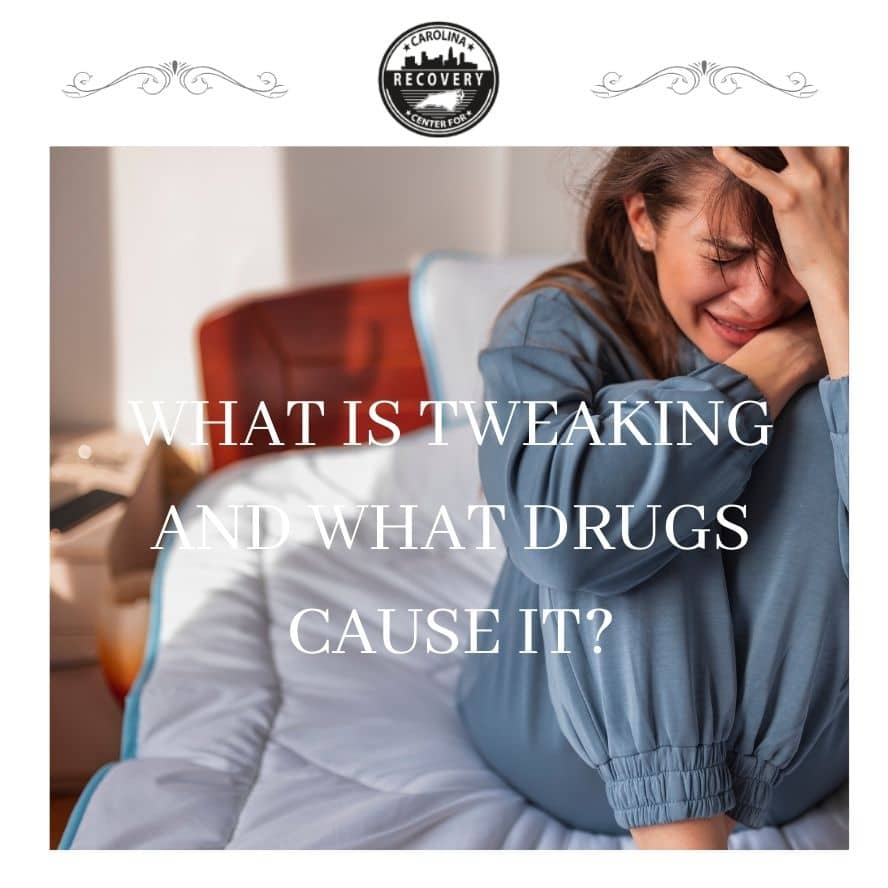What is Tweaking and What Drugs Cause It?

Medically Verified: 2/1/24
Medical Reviewer
Chief Editor

All of the information on this page has been reviewed and verified by a certified addiction professional.
“Tweaking” is a term used to describe a state of mind that individuals experience after binging on methamphetamine. Meth is a highly potent stimulant that increases activity in your central nervous system. It usually comes in the form of a white or transparent crystalline substance or powder that is odorless and bitter tasting.
According to the National Institute of Drug Abuse, 2.5 million people aged 12 or older abused methamphetamine in 2021.[1]
Meth causes a wide range of adverse effects, including extreme paranoia, an inability to sleep, rapid weight loss, and an increase in mental health symptoms. Because methamphetamine is highly addictive, it is possible to develop a meth use disorder after the first or second time you abuse the substance.
Because of the dangers of long-term methamphetamine abuse, learning what tweaking is and how professional rehab can help is of the utmost importance.
What is Tweaking?
While tweaking is associated with a wide range of psychological symptoms, you can also experience physical effects. When someone is addicted to meth, they will continuously abuse or “binge” the drug to avoid experiencing a comedown. People begin to “tweak” after they engage in a methamphetamine binge. Tweaking occurs at the end of a binge and is characterized by cravings and desperation as well as psychotic symptoms such as delusions, hallucinations, and altered perception.
If you are binging on methamphetamine, you will eventually run out of the substance, and if you are unable to obtain more, the effects of the drug will begin to wear off. This is known as a methamphetamine comedown.
Methamphetamine comedowns are associated with the loss of desired effects and the onset of extremely uncomfortable withdrawal symptoms. Oftentimes, meth comedowns include intense cravings to abuse the drugs coupled with feelings of desperation to obtain methamphetamine.
What are the Effects of Methamphetamine?
Tweaking is a physical and psychological state that usually occurs after you become addicted to methamphetamine and are engaging in continuous use. However, there are other short-term effects of meth abuse that you should be aware of.
If you are abusing meth, you are most likely looking for an immediate and potent high that includes euphoria and increased energy levels. While you can experience a short 30-minute rush of euphoria immediately after using methamphetamine, the other effects of this drug can last up to 12 hours.
Short-term effects of meth include:
- A rush of euphoria
- Anxiety, panic attacks, or paranoia
- Delusions or hallucinations
- Weight loss due to decreased appetite
- Inability to sleep
- Severe mood swings
- Unpredictable or impulsive behavior
- Tremors
- Hyperthermia
- Increased heart rate and blood pressure
- Heart palpitations
According to the National Institute of Drug Abuse (NIDA), “Methamphetamine can also cause a variety of cardiovascular problems, including rapid heart rate, irregular heartbeat, and increased blood pressure. Hyperthermia (elevated body temperature) and convulsions may occur with methamphetamine overdose, and if not treated immediately, can result in death.”[2]
The signs of a meth overdose include:[3]
- Tremors
- Loss of muscle control
- Labored, slowed, or stopped breathing
- High or low blood pressure
- Chest pain and irregular heart rate
- High body temperature
- Paranoia and agitation
- Hallucinations and psychosis
- Seizures
- Heart attacks
- Stroke
While methamphetamine may provide you with feelings of happiness and increased energy, the other symptoms and side effects you could experience are extremely dangerous. From paranoia and psychosis to seizures, heart attacks, and life-threatening overdoses, methamphetamine is not a safe drug to misuse.
Long-Term Dangers of Meth Abuse
Prolonged meth abuse can lead to severe anxiety, paranoia, insomnia, and even violent behaviors. Some individuals experience suicidal thoughts and ideation due to the psychological effects of methamphetamine, particularly during a comedown or while “tweaking.”
After you have been using meth for an extended period, you will develop a tolerance. This means that the same amount of the substance you are used to taking will no longer cause you to feel high. You will only experience the adverse side effects of meth abuse instead of rushes of euphoria.
The long-term dangers of meth abuse include:[4]
- Addiction and cravings for meth
- Development of tolerance
- Inability to feel pleasure
- Increased symptoms of anxiety
- Insomnia
- Mood disturbances
- Violent behavior
- Psychotic symptoms like hallucinations and delusions
- Reduced motor speed and impaired verbal learning
- Emotional and cognitive issues
- Severe tooth decay and tooth loss
- Extreme weight loss and malnutrition
- Skin sores
Meth abuse is extremely dangerous. Even short-term use of this drug can lead to significant issues such as paranoia, psychosis, and overdose. If you or a loved one are addicted to methamphetamine and frequently experience tweaking, attending a drug rehab program can provide you with the tools and support you need to achieve long-term recovery.
Finding Help for Meth Abuse and Addiction
Meth addiction can lead to an array of psychological and physical health issues. If you suffer from mental health issues of any kind, abusing this substance can worsen your symptoms substantially. Some individuals may develop psychotic disorders after long-term methamphetamine abuse because of the way it affects the central nervous system.
A drug rehab center can provide you with the treatment, support, and tools you need to recover from meth addiction and maintain long-term sobriety. Contact Carolina Center for Recovery today to learn more about our meth addiction treatment program in North Carolina.
References:
- https://nida.nih.gov/publications/research-reports/methamphetamine/what-scope-methamphetamine-misuse-in-united-states
- https://nida.nih.gov/publications/research-reports/methamphetamine/what-are-immediate-short-term-effects-methamphetamine-misuse
- https://www.ncbi.nlm.nih.gov/books/NBK430895/
- https://nida.nih.gov/publications/research-reports/methamphetamine/what-are-long-term-effects-methamphetamine-misuse

